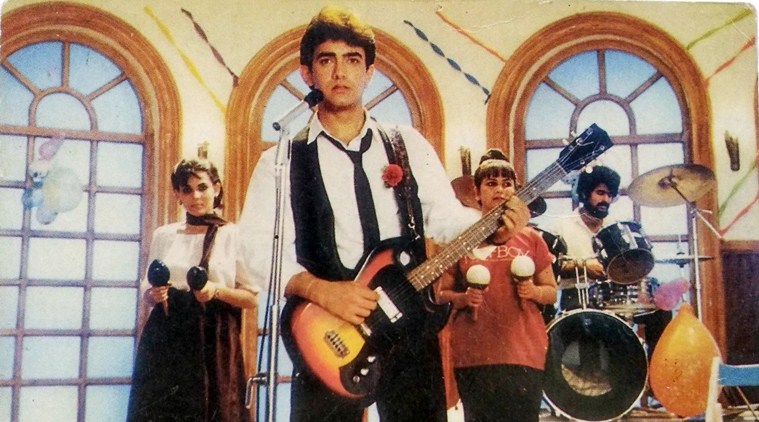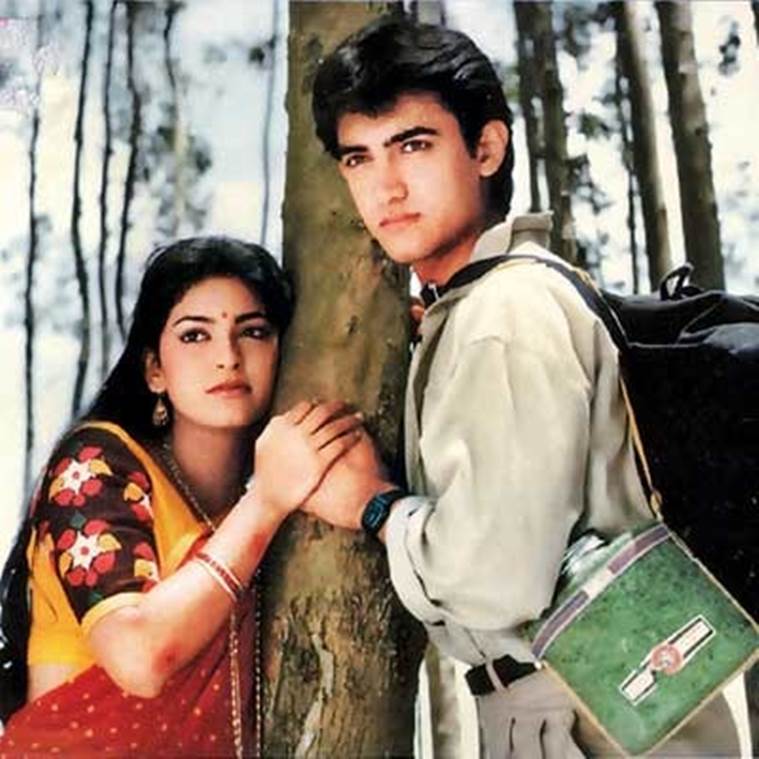 Qayamat Se Qayamat Tak songs had enthralled listeners of their time and even today, they have a life of their own.
Qayamat Se Qayamat Tak songs had enthralled listeners of their time and even today, they have a life of their own.
Aamir Khan’s 2012 Time magazine cover profile described “Papa kehte hain” from 1988’s Qayamat Se Qayamat Tak (QSQT) as not just a song but a cultural moment that made him a “movie star.” Directed by cousin Mansoor Khan, the film co-starring another bright newcomer, Juhi Chawla, became 1988’s top-grosser. More than a movie, it was a bellwether — predicting that this leading man would someday become a ‘Box-office King.’ Khan was only 23 when QSQT released, with his entire career ahead of him.
As he himself expressed some anxiety (vocals: Udit Narayan), “Papa kehte hain bada naam karega, beta hamara aisa kaam karega/Magar yeh toh koi na jaane, ki meri manzil hai kahan.” Strumming guitar (a done thing, back in the 1980/’90s), our protagonist is worried about his future. Some will become engineer and business tycoons, how will the game turn out for Raj (Khan’s lover-boy character)? Well, you could argue on screen at least, in the decades that followed he has fulfilled both those impossible dreams by playing an eccentric engineer in 3 Idiots and business magnate in Dil Chahta Hai and Ghajini. Unless you are suffering from Ghajini-style amnesia, you might know that the 1980s was not a very exciting decade, but QSQT and “Papa kehte hain” managed to capture the zeitgeist. It’s hard to believe that the youthful lyrics are penned by the great Majrooh Sultanpuri. How could a man who wrote for Dev Anand and Guru Dutt in the 1950s catch a whiff of the changing wind of the ’90s? With the QSQT album, Sultanpuri proved his mettle as a lyricist of extraordinary flexibility and versatility. Moreover, he shared a great working relationship with Khan’s uncle Nasir Hussain (starting with Tumsa Nahin Dekha) whose son Mansoor Khan was making his directorial debut with QSQT. There was no way Sultanpuri would’ve turned down this ambitious family project. With melodious music by composers Anand-Milind, the QSQT songs had enthralled listeners of their time, and even today, they have a life of their own.
The original Student of the Year
If one measure of a hit song is how widely it has been parodied, then “Papa kehte hain” is a legit winner. Twice, Khan himself has used it for comic effect, most famously in Andaz Apna Apna. Karan Johar choose to introduce a bare-chested Varun Dhawan with this song in Student of the Year in 2012. What’s more, the title of one Mahesh Bhatt film was also inspired by the song (which some of you might say isn’t a big deal because nearly every Mahesh Bhatt film was inspired). A college anthem, “Papa kehte hain” plays at the campus farewell as students-of-the-year bid adieu to their charmed academic life and fan out into the world that may or may not be waiting to embrace them. Khan’s ex-wife Reena Dutta makes a brief appearance. Can you spot her? She’s that shy wallflower sitting next to one of the swooning girls. Explaining the song’s appeal to its global readers, Time magazine wrote, “The lyrics, the look and the attitude captured both the aplomb and anxiety of youth, and the fun-loving, fresh-faced actor who embodied those qualities became an instant favourite of millions.”
In Raj’s (Aamir Khan) case, the lyrics are prescient. Those who have seen the film will know its doomed ending. Bollywood has always mined the Romeo-Juliet tragedy (Kamal Haasan and Rati Agnihotri’s blockbuster Ek Duuje Ke Liye, to cite just one example from the 1980s), but Mansoor Khan’s QSQT was hugely successful in reinventing the genre at a time when action was de rigueur. The film follows Raj and Rashmi (Juhi Chawla) whose budding romance is anathema to their warring families. Despite vociferous objections, they meet and ultimately, elope. Khan and Chawla had teamed up in several ’90s hits (Hum Hain Rahi Pyar Ke and Ishq), but their pairing in QSQT remains a kind of ‘flagship’, especially when you think of the many popular songs picturised on them including the three duets, “Aye mere humsafar”, “Gazab ka hai din” and “Akele hain toh kya gham hai”. Chawla recalled years later, “Aamir and I used to fight like kids on sets. He would tease me… we have seen him play pranks on other heroines, it was such a fun time.” The real-life bonhomie shows on screen. It is exactly their childish and raw innocence that makes their ’90s collaboration so special.
 A still from Qayamat Se Qayamat Tak featuring Aamir Khan and Juhi Chawla.
A still from Qayamat Se Qayamat Tak featuring Aamir Khan and Juhi Chawla.
Unstoppable at 55
More than three decades later, while the bubbly Juhi Chawla has faded out of celluloid and Mansoor Khan retired to pursue a quiet farmer’s life, the Aamir Khan juggernaut continues unbated. He has gone from farm to table to chef to owning the restaurant! AK turns 55 today, still enjoying a well-earned status as one of Hindi cinema’s reigning showmen. He has much in common with the fellow Khans (Salman and Shah Rukh) and even resembles them in age, but box-office-wise, Mr Perfectionist is light-years ahead of them all. As producer Tahir Hussain’s (Nasir Hussain’s younger brother) son, the Dangal star had started out as an assistant director way back in the 1980s — born to the movies, he was. He demonstrated his love for acting early on when he appeared as a child artiste in uncle Nasir Hussain’s lost-and-found melodrama, Yaadon Ki Baaraat. Today, no Aamir Khan interview/profile is complete without a serious discussion on his ‘method,’ and ‘Midas touch’, so much so that he has often been accused of ‘ghost directing’ his movies. Once, Shekhar Kapur had famously declared, “Aamir Khan is a repressed director.”
Yet, the filmmaker of Taare Zameen Par is a Bollywood original. Think about it, few stars have taken the risks he has. A game-changer and record-breaker in every sense of the word, his many ‘firsts’ make him a rarity in contemporary Hindi cinema. He was the first mainstream star to believe in ‘content is king’ mantra, the first to do one film at a time, the first to say no to awards, the first to exploit get-ups/appearances and cross-promotions, the first to produce edgy popular cinema (Peepli Live, Dhobi Ghat, Delhi Belly), the first commercial attempt to Oscar (Lagaan), the first 100 crore club title (Ghajini, effectively making him the inventor of the coveted holiday blockbuster), Bollywood’s first Chinese crossover (3 Idiots, Dangal) and the first to turn Indian TV into a vehicle for social change (Satyamev Jayate). For the latter, he has faced stinging flak — a publicity-hungry star who will stop at nothing to hog the limelight and the idealistic social activist who will vanish into his cosy, elite life once his TV show/films have minted their bucks. All that may be true (his defenders say he’s a soft target). So is the fact that Khan has been one of the few entertainers to have stepped out of his comfort zone more often than others. Not sure where you stand on Raj and his tragic fate, but Aamir Khan’s inspirational success story must have made papa (the late Tahir Hussain) proud.